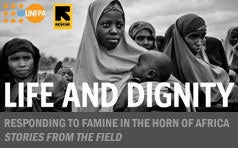News
Twenty-five Children: A Safety Net in Kenya’s Poorest Region
- 14 October 2011
News
GARISSA, Kenya —“I’ll have children until I die,” says Mohammed Abdi, a 56-year-old man who is expecting his 25th child.
Mohammed and his family, which includes three wives, lost 200 head of cattle during the drought, which is affecting millions of people in the Horn of Africa. Once a proud nomad who used to roam the vast plains of northern Kenya with his cattle, Mohammed now sits at home all day. Children, he says, are his only remaining wealth.
“Even if I had only two or three children, how would I pay for their school fees when all my livestock is dead?” he asks.
Abdi’s situation illustrates some of the challenges faced by UNFPA and its partners when advocating for birth spacing in the region.
Kenya’s North Eastern Province, where Mohammed’s village is located, is in the country’s poorest region and the one worst hit by the crisis.

Illiteracy levels are high and traditions encouraging early marriage and large families prevail. Polygamy is common.
Traditionally, children in this part of the world have been considered a source of wealth, especially for pastoralists. But maternal and infant deaths are already among the highest in the world here, and every pregnancy multiplies the risk to both mothers and children.
“We know that use of family planning is low here. We want women to be able to space their births, get themselves healthy and have the number of children they can look after,” said UNFPA’s Executive Director during a visit to the area in early September.
According to Kenya’s 2010 National Demographic and Health Survey, the average number of children for women aged between 15 and 49 years in the North East Province is nearly 9. In Kenya’s capital, Nairobi, with much higher levels of education and access to contraceptives, the average number of children is fewer than 3.
Given the current humanitarian situation, UNFPA and its partners have scaled up its activities for the promotion of family planning. Indeed, in times of crisis when skilled birth attendance and emergency obstetric care may not be readily available, an unplanned pregnancy can be fatal.
The Kenya Red Cross, which is one of UNFPA’s key partners in the region, has been distributing emergency contraceptives to residents. Workers are also engaged in a reproductive health campaign to educate residents on the benefits of longer intervals between births.
Ms Jawahir Diriya, a home-based care assistant working with the Kenyan Red Cross, said they were targeting young people who appeared more willing to listen.
“Due to pastoralism in the region, having many children is an asset,” explains Dr. Mohammed Sheikh, the government’s director of public health in the region, “But at the moment it is probably a burden which people have not realized.”
Indeed, the extended drought and current famine have highlighted the toll that having large families take on both mothers and children: Photographs from the area depict skeletal children, malnourished mothers and devastated fathers laying tiny wrapped bundles in holes dug in the red, dusty soil.
Although health facilities are currently overstretched, health workers have noticed an increase in the uptake of family planning methods. Women who receive post-natal care are also offered family planning counseling, together with their husbands.
"We are doing all we can on the short term but the world needs to think long-term," explained Bunmi Makinwa, UNFPA’s Africa Regional Director. In the meantime, UNFPA and its partners are ensuring that Mohammed’s expectant wife is getting the prenatal care she needs to give birth safely.
— Patrick Mathangani